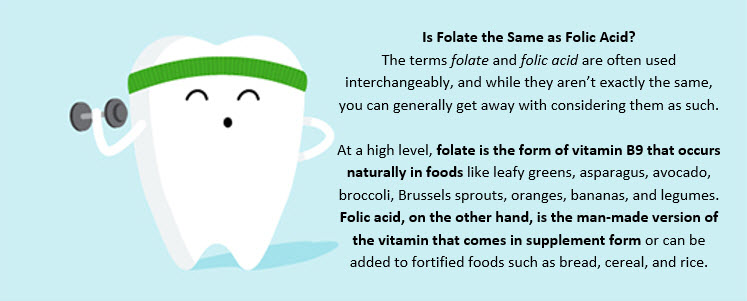Originally published January 2021. Updated January 2023.
You may or may not have heard of folic acid (otherwise known as folate or vitamin B9). The powerhouse nutrient is probably most known for the role it plays during pregnancy, but it’s also a key ingredient for keeping all our mouths healthy and strong.
What is folic acid for and how do you get it? Learn all about the benefits of folic acid for your oral health and how to use it to give yourself a sparkling, healthy smile.
A healthy smile is just the first step – sign up for MySmile® and take control of your oral health!
Get Your Quote
What is Folic Acid?
Folic acid is essential for ensuring the proper production of red blood cells. It manages the ways our cells divide and carry oxygen throughout the body, thereby promoting healthy cell growth and repair, as well as prevention of disease.
Studies have also shown that the vitamin plays a crucial role in the formation of our DNA. Folic acid deficiency has been linked to chromosome breakage, which can lead to an increased risk for certain cancers and cognitive defects.
How can Folic Acid affect your oral health?
Folic acid is remarkably important in supporting the cells that make up the gums, as well as the mouth’s ability to fight off inflammation and disease. People with folic acid deficiencies can find themselves at a higher risk for early signs of gum disease, including bleeding along the gum line, bad breath, and cavities.
If not addressed with proper diet and dental care, the symptoms of low folic acid can lead to even worse oral conditions. Advanced periodontal disease can cause visibly receding gums, loss of teeth, and the need for invasive periodontal treatment.
Folic Acid for Gum Disease
The good news is that studies have shown folic acid to be a successful method for reducing inflammation and bleeding in people with gingivitis, and may even prevent these issues from developing at all. What’s more, if a patient does end up needing periodontal treatment, folic acid can help with post-procedure healing and might prevent symptoms from returning later.
How do you get Folic Acid?
Vitamin B9 comes in two main forms: folate and folic acid. So, what’s the difference? Essentially, folate is the form of vitamin B9 that naturally occurs in food, while folic acid is the man-made version that comes in supplements and fortified foods.

As with most essential vitamins, it’s best to get as much of your vitamin B9 as you can from a healthy diet. Foods that are high in folate include leafy greens, asparagus, avocado, Brussels sprouts, broccoli, bananas, oranges, and legumes. Foods that are often fortified (such as breads, cereal, and rice) can also have high amounts of folate.
While a balanced diet is key, some people may still benefit from adding a folic acid supplement or mouthwash to their daily routine. (Some studies have shown that, in people with gum conditions, a folic acid mouthwash was more effective at treating the issue than a folic supplement pill.)
How much Folic Acid do you need?
The National Institutes of Health offer the following recommendations for daily doses of folic acid in micrograms (mcg):
| Age | Recommended Daily Amount |
|---|---|
| Birth to 6 months | 65 mcg* |
| 7 to 12 months | 80 mcg* |
| 1 to 3 years | 150 mcg |
| 4 to 8 years | 200 mcg |
| 9 to 13 years | 300 mcg |
| 14+ years | 400 mcg |
*Equivalent to the intake of folate in healthy, breastfed infants.
But certain groups may need even higher doses of folic acid of that. These groups might include:
- Women who are pregnant or lactating, as the body’s demand for folate increases
- People with malabsorptive conditions such as celiac disease or IBS
- People who might not be getting enough folate due to limited diets
- People who consume excessive amounts of alcohol, as it interferes with folate absorption
Keep in mind that, while folic acid certainly has its benefits, taking too much could have potentially negative effects. This might be especially true for people who eat high volumes of folic-fortified foods or take other daily supplements. (A typical multivitamin already has the recommended daily dose for most adults, so an additional supplement may not be wise.)
As for your oral health, eating a diet of folate-rich foods and staying on top of proper at-home care are your first lines of defense against gum inflammation and disease. But should your mouth still need a little extra help, speak with your dentist to see if a folic acid supplement or mouthwash could be right for you.
A healthy smile is just the first step – sign up for MySmile® and take control of your oral health!
Activate your account


